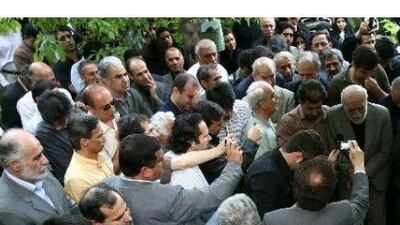The grieving daughter of a respected Iranian dissident died at her father's funeral yesterday in circumstances as tragic and controversial as they were politically charged.
The family of Haleh Sahabi, 54, an opposition activist and women's rights campaigner, said she collapsed and apparently suffered a fatal heart attack when mourners scuffled with security officials, who tried to stop the ceremony. Iranian authorities insisted there were no clashes.
Within hours, a Facebook page declaring "We are ALL Haleh Sahabi" had 2,700 supporters, and their number was growing by the minute. There were calls on Twitter for candelit vigils to honour her last night.
Sahabi had been serving a two-year prison sentence but was allowed temporary leave last month when her father, Ezatollah Sahabi, 81, went into a coma.
The family are prominent members of a movement that unites Islam and nationalism, while advocating a separation between state and mosque. The Sahabis are also followers of the late prime minister, Mohammad Mossadegh, who led Iran's oil nationalisation and was overthrown by an Anglo-American-inspired coup in 1953.
Ms Sahabi's death comes at a particarly tense moment in Iranian politics and could be the spark that re-ignites Iran's long dormant and ruthlessly suppressed green movemement, analysts said.
Activists last weekend had already called for a silent protest in Tehran on June 12 to mark the second anniversary of president Mahmoud Ahmadinejad's "stolen" re-election, which triggered mass street protests. Sahabi was part of a group of government critics who were arrested in front of parliament during his swearing-in ceremony.
Two years ago, Iran's often bickering hardliners united against those challenging Mr Ahmadinejad's election, which was anointed by Iran's supreme leader, Ayatollah Ali Khamenei.
Now with the "greens" marginalised, the regime has been convulsed by a prolonged and even more divisive power struggle within its ruling, hardline elite that has pitted Mr Ahmadinejad against influential politicians and clerics. They accuse him of trying to monopolise power.
Ayatollah Khamenei called for a truce at the weekend, but the warfare continued apace yesterday. The president's opponents in parliament insisted that he had acted illegally in declaring himself caretaker oil minister last month and referred the case to the judiciary.
Despite the Iranian regime's deeply unconvincing claims that the Arab awakening was inspired by Iran's 1979 Islamic revolution, it is deeply concerned that the tumult sweeping the region could remind Iran's youth of the potential of people power.
A mourner at yesterday's funeral told the BBC: "Following the uprisings in the Middle East, the Iranian government is very nervous about people's gatherings for any reasons, particularly if it is related to an opposition figure."
Iranian security forces have broken up funerals involving other dissident figures in the past, concerned that the ceremonies could provoke fresh protests. Sahabi's son, Yahya Shamekhi, told opposition news websites that security forces had stopped mourners carrying his grandfather's body, which was shrouded in an Iranian flag, to the cemetery.
"There were fierce quarrels and tensions. Finally they took the body away by force. Then my mother fell down and became unconscious," he said. "The doctor told us she died because of a heart attack."
Mr Shamehkhi, however, rejected some accounts that his mother was physically assaulted by security forces. The Iranian authorities maintained there had been no scuffles at the cemetery in Lavasan, a small mountainside town just north of Tehran. Alireza Janeh, head of security at the Tehran governor's office, said Ms Sahabi had died of heart problems exacerbated by the stress of her father's death and "hot weather".
Iran's official news agency, IRNA, claimed that some mourners were disrespectful to law-enforcement officers and five were arrested as they tried to disturb the peace. Among those reportedly detained was Hamed Montazeri, the grandson of a revered dissident ayatollah whose death in December 2009 was followed by huge pro-democracy protests.
Hamed's father, Ahmed, told the opposition Jaras website that Sahabi collapsed when security forces yanked a photograph of her father from her that she had been clutching to her chest.
Ezatollah Sahabi, who died of a stroke on Monday, was a member of the interim government installed after the 1979 Islamic revolution. It resigned in protest over the seizure of the US embassy in Tehran that led to the historic rupture in relations with the US that exists to this day.
Ezatollah Sahabi went on to become a leading figure in Iran's religious-nationalist opposition group, the Freedom Movement of Iran, which, although banned, has always had a considerable following. He was widely respected for his patriotism and, like many dissidents, spent many years in jail both under the Shah's regime and that of the Islamic republic.

